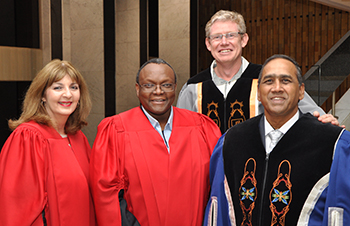Latest News Archive
Please select Category, Year, and then Month to display items
31 July 2020
|
Story Lacea Loader

As a public higher-education institution in South Africa with a responsibility to contribute to public discourse, the University of the Free State (UFS) will be presenting the 3rd UFS Thought-Leader Series in collaboration with Vrye Weekblad as part of the Vrystaat Literature Festival’s online initiative, VrySpraak-digitaal.
This year, higher-education institutions
globally are placed in the challenging context of COVID-19. Aware and grounded in the reality that the world will not return to the normality of pre-COVID-19, our responsibility as scholars still remains to contribute to public discourse and to offer
innovative solutions that will impact the lives of people nationally and globally in order to help them understand and adapt to a new world order.
Against this background and context, this year’s debates focus on ‘Post-COVID-19, Post-Crisis’,
with Health and Modelling, Politics, Economy, and Predictions for 2021 as the sub-themes. Placed in a COVID-19 context, and in lieu of the Vrystaat Arts Festival,
the series will be presented virtually in the form of one webinar per month during the period August 2020 to November 2020.
Date: 13 August 2020
Topic: Health
and Modelling
Time: 11:30-13:00
RSVP: Alicia Pienaar, pienaaran1@ufs.ac.za
Facilitator:
Max du Preez
Editor: Vrye Weekblad
Biography
Introduction and welcome:
Prof Francis Petersen
Rector and Vice-Chancellor, UFS
Panellists:
Prof Salim Abdool Karim
Director: Centre for the AIDS Programme of Research in South Africa (CAPRISA)
Chair: South African Ministerial Advisory Committee on COVID-19
Biography
Prof Glenda Gray
President and CEO: South African Medical Research Council (SAMRC)
Biography
Prof Felicity Burt
NRF-DST South African Research Chair in vector-borne and zoonotic pathogens research
Biography
Prof Tim Murithi calls for Africa to design new global order
2016-06-02

From left: Prof Heidi Hudson, Head of Centre for Africa
Studies (CAS); Prof Tim Murithi, Extraordinary Professor
at CAS; Prof Lucius Botes, Dean of the Faculty of
the Humanities; and Prof Prakash Naidoo, Principal of
Qwaqwa Campus.
Photo: Stephen Collet
“What do Africans have to say about the remaking of the global order?” was the opening question of Prof Tim Murithi’s lecture which was hosted by the Centre for Africa Studies (CAS) of the University of the Free State (UFS) to celebrate Africa Day on 25 May 2016.
The annual Africa Day Memorial Lecture, entitled: Africa and the Remaking of the Global Order, doubled as Prof Murithi’s inaugural lecture. He is CAS’s newly-appointed Extraordinary Professor, as well as the Head of the Justice and Reconciliation in Africa Programme at the Institute for Justice and Reconciliation in Cape Town. He made a compelling argument for the need for Africa to exert an active influence on international narratives of peace, governance, justice, and reconciliation.
“If we are waiting for American leadership to get us out of the quagmire of a situation we are in, we will be waiting for a long time,” said Prof Murithi.
The Head of the Centre, Prof Heidi Hudson, concurred with Prof Murithi’s suggestion of devising African solutions for African problems. She quoted Audre Lorde’s well-known assertion that “The master’s tools will never dismantle the master’s house.”
Remembering 1963
Over five decades ago, on 25 May 1963, the Organisation of African Unity was formed, and was renamed the African Union in 2002. Africa Day marks this pivotal point in the continent’s history. On this day, we reflect on the continent’s journey into democracy, peace, stability and socio-economic development. It is also an opportunity to celebrate African identity and heritage.
Continent-building dialogues
The UFS Sasol Library celebrated Africa Day with a book launch. Facets of Power. Politics, Profits and People in the Making of Zimbabwe's Blood Diamonds by Tinashe Nyamunda is a reflection of some of the challenges that Zimbabwe continues to face. It details the disadvantaged position which the country finds itself in due to greed, maladministration, and corruption, despite possessing large deposits of minerals.
In celebration of Africa Month, CAS has held a series of lectures by esteemed scholars from across the globe. Earlier in the month, Prof Henning Melber presented lectures on Namibia’s independence and the African middle class. Kevin Bloom and Richard Poplak unpacked the issues surrounding Africa’s continental shift, while Prof Joleen Steyn Kotze focused on the possible fall of the African National Congress.